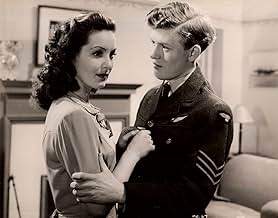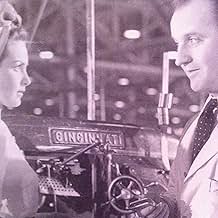A young woman called into service at a factory during World War II falls in love with a member of the RAF.A young woman called into service at a factory during World War II falls in love with a member of the RAF.A young woman called into service at a factory during World War II falls in love with a member of the RAF.
- Directors
- Writers
- Stars
- Mrs. Blythe
- (as Amy Vaness)
- Mrs. Hammond
- (uncredited)
- Brenda - Worker at the Factory
- (uncredited)
- Directors
- Writers
- All cast & crew
- Production, box office & more at IMDbPro
Featured reviews
The cast is fine - Patricia Roc and Gordon Jackson headline as Celia and Fred, with Anne Crawford as Jenny and Eric Portman as down-to-earth foreman Charlie. There's also a bit for Radford and Wayne to do (an amusing scene where their travelling soldiers in a railway carriage get overrun with evacuees). Megs Jenkins also plays Gwen with some style and pathos. Patriotic hokum it may be, but I like the foregrounding it gives to the women (especially Jenny, who I quite like by the end of it) and the respect it gives to the factory girls and what they did for their country.
This movie is part love story and part propaganda-flic. The propaganda elements are more subtle than in many 40s films eg 'The Next of Kin'. However the life of the factory girl is glamourized. This is Celia's escape from the domestic drudgery of caring for her elderly father and allows her to find true love. Also the togetherness of the factory girls is emphasised throughout the film. The contrast between shots of Celia demure and alone that we see at the start of the film and the final scene of her as an integral part of the group is marked. Not only is munitions work vital to the war effort, we are being told, but it also provides companionship, an outlet and fulfillment for women.
A film about and for women in the workplace may sound like a step forward from the usual patriarchal portrayal of the female sex. Yet, at its heart this is a deeply conservative film. Ultimately Celia finds fulfillment with and through a man and whilst the companionship of women is important, all the female characters are searching for a husband.
However, the Directors should be applauded for having done a good job in making an enjoyable, informative propaganda film.
By the way, look out for the shots of Patricia Roc's feet when she is talking to her husband. Is this an erotic charge or fear of chilblains? Watch the movie and let us know what you think.
This fast paced, light hearted and heartbreaking film about England during WWII starts great and gets better as it goes. The amazing thing, really, is that it was shot during the war and maintains a grim honesty as well as a necessary optimism. Hitler has to be defeated—but the movie makers, and all the actresses in their homespun honesty, did not know he would be.
There are some who label this purely a propaganda war film, and that the gritty lack of romanticizing is part of preparing the populace for the overwhelming nature of the problem. And somehow in an hour and a half you really sense how a country could be turned inside out. The cheerful holiday at the shore that starts the movie turns to families being broken up, women having to work in factories, and eventually news of family members never to return, killed in action.
The American documentary that comes to mind here is "Rosie the Riveter," about the enormous contributions of women in hard core industry (the poster to that shows a woman with a jackhammer). This is a fictional telling of the same idea, and it's far more enjoyable and in fact moving. (The poster for this film just shows a woman's face, with family members in the background—this is about the hearts and souls of the situation.)
I don't think of this as a true "propaganda" film for some simple reasons (all of which make me like the movie more). Foremost, it's not a government sponsored or requested movie—it's not technically in service to some greater force (as propaganda really has to be). It does of course support the home cause, the war against Hitler, and it does so in a way that the audience will pay to see. That's the bottom line here—this is a really compelling romance about real people in a real contemporary world that the audience knows very well. There are countless people to relate to, and details to recognize. The love story aspects are not developed very well, but they are overflowing with sincerity.
Wikipedia mentions that the movie was a "hit" in the USSR, which was also fighting Hitler. And the reason (to me) is simple: it's about regular people, the plight of the working class. There are few pretensions here (if any). And the filming is unusually tightly framed, by which I mean the compositions fill the frame, almost cramping the space on the screen, and it makes for a pleasure to watch, and makes for a lot to look at in every frame. And then the acting itself, without star power, is so straight forward and believable, even the slower moments make you pay attention.
A great film in a vein very very different than, say, "Casablanca" in 1942 (which some people also label as propaganda!). And it came out the same year, and in a way had the same larger context, though beyond that there is nothing in common at all. The point being that this is a terrific film on many levels once you let go of the more polished, and more immediately impressive American films of the same time.
Did you know
- TriviaGrandpa Jim comments that his daughter Phyllis has progressed from dating "local lads" to "the United Nations." Interestingly, although the international organization with that name did not exist until two years after the film's release, the term "United Nations' was used to describe the allied forces arrayed against the Axis Powers. FDR used the term frequently.
- GoofsAlthough Fred Blake (Gordon Jackson) is flight crew on a Short Stirling (the type of aircraft Celia makes parts for and which is seen being towed out of the factory), there are at least two shots of Fred's aircraft taking off/climbing which are actually an Avro Lancaster.
- Quotes
Charlie: You can't cook or sew, I doubt if you can even knit. You know nothing about life, not what I call life. You're still only a moderate hand on a milling machine and if you had to fend for yourself in the midst of plenty you'd die of starvation. Those are only your bad points. I'm not saying you haven't got any good ones.
Jennifer: You're mighty generous Mr Forbes. As for you, you've no looks, you're old fashioned, morbidly suspicious, dull, and your pipe makes horrible bubbly noises.
- Crazy creditsOpening credits --- over archive footage: NOTE: The orange is a spherical pulpish fruit of reddish-yellow color.
- ConnectionsFeatured in The Unforgettable Gordon Jackson (2012)
- SoundtracksSymphony No. 5 in C minor, Op. 67
(uncredited)
Music by Ludwig van Beethoven
Played over main titles and later in the score
- How long is Millions Like Us?Powered by Alexa
Details
- Runtime1 hour 43 minutes
- Color
- Aspect ratio
- 1.37 : 1
Contribute to this page



































